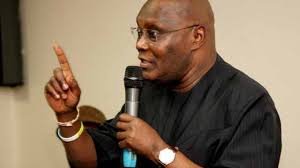Biafra: Atiku reveals what IPOB, hate speeches has caused in Nigeria
Atiku
Abubakar, an Ex-Vice President of Nigeria says the agitation for secession
spearheaded by the Indigenous People of Biafra, IPOB, and hate speeches have
made present day Nigeria more divided than ever.
The former
Vice President made the observation at the 40th anniversary of the Federal
Government College, Okigwe, Imo State, over the weekend.
Represented
by his media aide, Paul Ibe, Abubakar stated that all tribes of the country
needed one another to achieve their desired goals.
Abubakar
emphasised the need for unity among the various groups in the country.
He said,
“This celebration is coming at a critical time in our country’s history.
“All of you
must be aware of the recent agitations from different parts of the country,
with some groups threatening violence and, in some cases, secession. These
agitations are the result of a number of factors which I will not bother going
into at this time, although since you are all enlightened men and women, I have
no doubt that you are well and fully aware of what they are.
“As a result
of these various forces, the Nigeria of today appears more divided than it has
ever been before. Our country is not at war in the sense of guns and bombs, but
the level of inter-ethnic discontent, hatred, and hate speech is at an all-time
high.
”Recently,
Nigeria has been embroiled in secession calls particularly from the Indigenous
People of Biafra, IPOB, in the South-eastern part of the country.”
The
secessionist movement which calls for an independent state of Biafra, a
republic that existed for about three years during the Nigerian civil war, was
in September designated a terrorist group by the Nigerian government.
“To quell
the tension which has arisen from IPOB agitation and that of other groups, many
Nigerians have called for restructuring of the political system.
“You know
from personal experience that the Hausa man’s problem is not the Igbo man, that
the Igbo man’s problem is not the Yoruba man, that the Yoruba man’s problem is
not the Hausa man, etc.
“You know
the beauty of unity, of living together as brother and sister, in the same
dormitory, in the same classroom, of belonging to the same house and working
towards the same goal, whether it be winning a medal during inter-house sports
competitions or a prize during a quiz competition. You know that, at those
critical times when everyone’s eye is on the goal, the Hausa, Igbo and Yoruba
need one another, must depend on one another to achieve”, he said.
He traced
the establishment of the school and other federal government colleges to a
conscious move by the then military administration to promote unity after the
civil war.



Comments